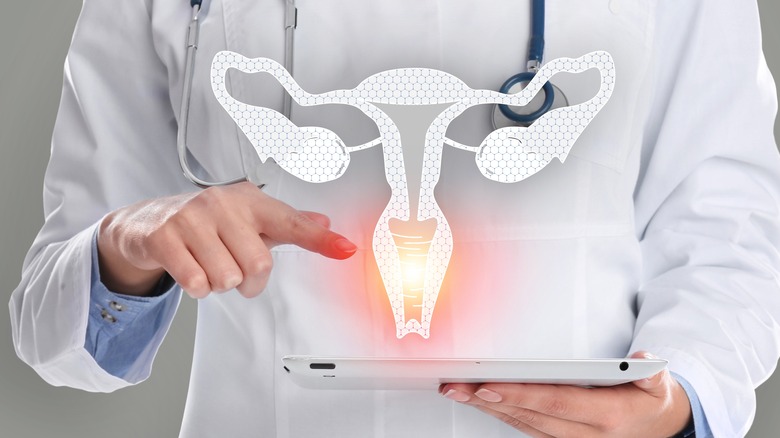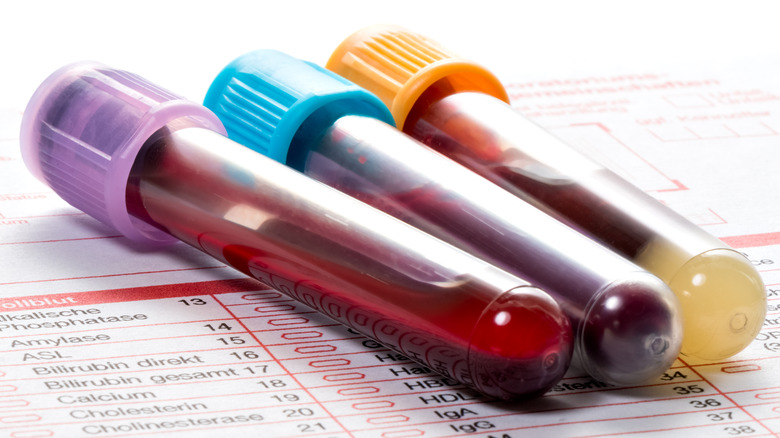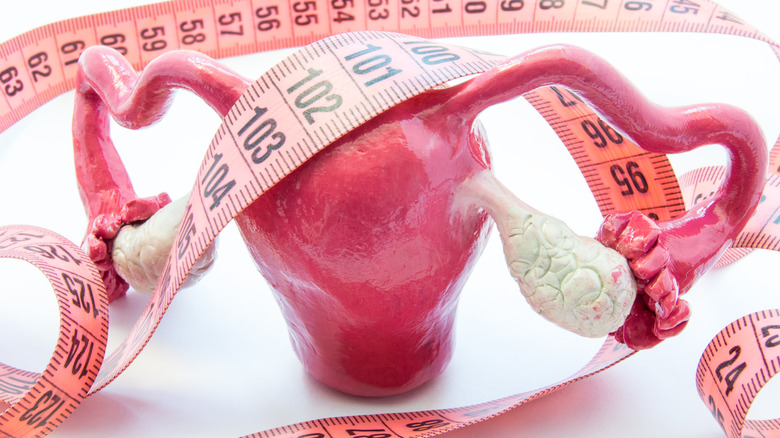10 Unexpected Signs Of Endometrial Cancer
Endometrial cancer is a form of uterine cancer that begins in the lining of the uterus, called the endometrium. According to the Mayo Clinic, endometrial cancer is the most common kind of uterine cancer. Often, endometrial cancer is called uterine cancer, even though it's not the only form of uterine cancer. Uterine sarcoma is another form of uterine cancer, but it's much rarer than endometrial cancer.
Doctors know that endometrial cancer happens when the cells of the endometrium mutate, but they have not yet figured out what causes the cells to mutate. When these cells mutate, they multiply and build up, forming a tumor in the uterus. When the abnormal cells start to invade other tissues in the body, more tumors can form.
The most common symptom of endometrial cancer is abnormal vaginal bleeding. For people who haven't reached menopause, this could show up as bleeding between menstrual cycles. However, since endometrial cancer usually happens after menopause, the most common symptom is vaginal bleeding after the menstrual cycle has ceased. Because post-menopausal people know they shouldn't have vaginal bleeding anymore, they typically talk to their doctor soon after the vaginal bleeding begins, which means they often get an early diagnosis.
Though abnormal vaginal bleeding is by far the most common symptom of endometrial cancer, there are some more unexpected symptoms as well. Here are some of the less common signs you should watch out for.
Abnormal vaginal discharge
Some people with endometrial cancer never experience abnormal vaginal bleeding, the most classic symptom of endometrial cancer, but they do have abnormal vaginal discharge. According to Healthdirect Australia, some people notice a watery vaginal discharge, which can have a strong, foul smell. Often, the vaginal discharge starts watery with a small amount of blood, and the amount of blood in the discharge increases over time, per the Office on Women's Health. However, abnormal vaginal discharge related to endometrial cancer can vary widely in appearance. According to Memorial Sloan Kettering Cancer Center, the discharge can be white or pink, and per WebMD, it may even be brown, thick, and smelly.
In rare cases, watery discharge can be mistaken for urinary incontinence. In one case study presented in the Taiwanese Journal of Obstetrics and Gynecology, the patient was experiencing clear vaginal discharge that didn't have a strong odor. Multiple doctors diagnosed her with urinary incontinence before a transvaginal ultrasound revealed endometrial tumors.
Even if the vaginal discharge doesn't appear to contain blood, anyone experiencing vaginal discharge after menopause should check in with their doctor about endometrial cancer. Though vaginal discharge can be normal after menopause, pink, brown, or blood-streaked discharge is not.
Trouble urinating
One study published in the Journal of Women's Health that explored non-menstrual symptoms of endometrial cancer found that problems with urination were relatively common for people with endometrial cancer. Patients with endometrial cancer at M.D. Anderson Cancer Center and Kelsey-Seybold Clinic, both large cancer centers, were asked to fill out a survey about their menstrual and non-menstrual symptoms. Over 50% of those patients indicated that they had experienced an increase in urinary frequency or urinary urgency (the sudden and urgent need to urinate). According to Johns Hopkins Medicine, some people also experience painful urination.
In rare cases, when a large endometrial tumor develops, it can press on different parts of the urinary tract, causing significant urinary symptoms. In one case study presented in BioMed Central Cases Journal, the patient's endometrial tumor was so large that it blocked the ureter, causing dangerous amounts of urinary retention. Research suggests that problems with urination are more common in older women with endometrial cancer than younger ones. Urinary tract problems are also more common in advanced endometrial cancer than early stage cancer.
Usually, urinary problems are accompanied by abnormal vaginal bleeding, the much more common symptom of endometrial cancer. However, when the cervix is closed (either because of previous disease or surgery), the blood can no longer exit the vagina. In these cases, urinary issues may be the first indicator of endometrial cancer. With that said, trouble urinating or painful urination on its own is rarely a sign of endometrial cancer.
Unintentional weight loss
Losing weight without trying isn't always a sign that something's off in your body. However, Dr. Munveer Bhangoo, an oncologist at Scripps MD Anderson Cancer Center, says that the sudden loss of 10 pounds or more without any clear explanation is cause for concern. While there are several diseases that can cause sudden, unintentional weight loss, but the American Society of Clinical Oncology states that 40% of cancer patients report experiencing this upon their initial cancer diagnosis.
As the immune system responds to the cancer cells, trying to eliminate them, it produces cytokines. These substances can disrupt both the metabolism and the hormones that signal your hunger cues. This can result in a loss of appetite and changes to the way your body burns calories. Because cancer cells require more energy to thrive, your body will burn more calories, even if you're not doing any extra physical activity. Additionally, cancers that develop in the abdomen, like endometrial cancer, can produce tumors that put pressure on the stomach. This pressure can make people with cancer feel full, even if they haven't eaten much at all.
The combination of all these factors can result in significant weight loss over a relatively short period of time. While sudden, unexplained weight loss is not always a cause for concern (and certainly doesn't automatically mean you have endometrial cancer), it's definitely something you should discuss with your doctor, especially if you're having any other symptoms that could indicate endometrial cancer.
Anemia
Because abnormal uterine bleeding — including very heavy menstrual bleeding, bleeding between periods, and bleeding after menopause — is the most common symptom of endometrial cancer, some people with endometrial cancer develop anemia, per MedicineNet. Anemia is the technical term for people who have a low red blood cell count. For people with endometrial cancer, anemia is a secondary symptom caused by abnormal uterine bleeding.
Sometimes in people with endometrial cancer, anemia is the result of heavy uterine bleeding, which leads to significant blood loss in a relatively short period of time. However, anemia secondary to endometrial cancer can also happen when slower blood loss occurs over a long period of time due to persistent uterine bleeding. On its own, anemia due to abnormal uterine bleeding is not usually a sign of endometrial cancer. According to the American Academy of Family Physicians, there are several causes of abnormal uterine bleeding that can cause secondary anemia.
However, people experiencing any form of abnormal uterine bleeding, especially bleeding after menopause, should talk to their doctor and get bloodwork done to check for anemia. If no other explanation for the abnormal uterine bleeding and secondary anemia is found, endometrial cancer may be the cause.
Fatigue
Fatigue is a common symptom experienced by people with all kinds of cancers. According to the American Cancer Society, people with fatigue feel excessively tired all the time and feel as if they don't have the energy to do almost anything. Sometimes, the fatigue is so severe that they can't perform simple tasks or engage in basic self-care. Unlike simply being tired from a lack of sleep, no amount of sleep, rest, or downtime resolves fatigue.
Cancer-related fatigue can be caused by a number of factors, one of which is low blood counts. Many people with endometrial cancer experience anemia (low red blood cell counts) because of abnormal uterine bleeding, per MedicineNet. So, people with endometrial cancer who develop anemia often experience fatigue.
Though fatigue is almost never the only noticeable symptom of endometrial cancer, one case study published in GPOnline proved that it can happen. A 65-year-old woman whose only symptom was progressive, increasing fatigue was found to have endometrial cancer after her blood work showed anemia and a CT scan was ordered to investigate whether the anemia was caused by problems with her GI tract.
This case aside, fatigue caused by endometrial cancer usually shows up as one of many symptoms that suggest endometrial cancer.
Nausea
When endometrial cancer progresses and begins to spread outside the uterus, it can cause a number of gastrointestinal problems, including persistent nausea, oncologist Dr. Eleonora Teplinsky told Insider. According to Cancer Research UK, about 70% of cancer patients deal with nausea at some point over the course of the disease.
Tumors that develop in the abdomen can put pressure on the stomach and the bowels, per Pharmacy Times, causing persistent nausea. Typically, nausea only occurs during the late stages of endometrial cancer.
Teplinsky added that some people with endometrial cancer don't have any symptoms until the disease has spread outside the uterus. In rare cases, nausea and other gastrointestinal problems can be the only symptoms of endometrial cancer. This makes diagnosis incredibly difficult because nausea is a vague symptom that can be attributed to myriad other diseases.
In the vast majority of cases, nausea will not be the only symptom of endometrial cancer, and is usually caused by something else. However, if you have nausea that lasts for more than a few weeks and another cause isn't apparent, imaging can help your doctor look for abdominal tumors from endometrial cancer.
Enlarged uterus
When cells in the endometrium, the lining of the uterus, mutate, they begin to reproduce very quickly, forming a tumor (Mayo Clinic). As the disease progresses, the tumor can get quite large, and additional tumors may form. According to the experts at Astra Vein & Endovascular Medical Care, a clinic specializing in vascular conditions, the presence of a large tumor or multiple tumors within the uterus can cause the uterus to expand, leading to a condition called an enlarged uterus.
According to Siteman Cancer Center, your medical provider may discover that your uterus is enlarged during a physical exam. There are several causes of an enlarged uterus, so this finding doesn't necessarily mean that you have endometrial cancer. Per ScienceDirect, diagnostic imaging can help determine whether or not an enlarged uterus is due to endometrial cancer. If diagnostic imaging shows a mass within the uterus, the features of the mass will indicate whether endometrial cancer or another condition is the most likely cause.
Endometrial cancer only causes an enlarged uterus when the tumor or tumors within the uterus are large enough to stretch the uterine walls. This typically occurs in the more advanced stages of the disease. So, an enlarged uterus is unlikely to be the first noticeable sign of endometrial cancer.
Bowel obstruction
In rare cases of advanced endometrial cancer, some people experience bowel obstructions. According to Cancer Research UK, tumors in the abdomen caused by endometrial cancer can grow so large that they press on the small or large intestines, causing a partial or complete blockage.
In extremely rare cases, endometrial cancer that spreads outside the uterus can cause tumors on the digestive tract. In one case study published in the Dubai Medical Journal, a 10-centimeter tumor was found on the small intestine of an 88-year-old woman. In another case study published in Case Reports in Gastrointestinal Medicine, a 5-centimeter tumor was found on the large intestine of a 71-year-old woman. In both cases, the patients experienced a bowel obstruction because of the tumors on their digestive organs.
The symptoms of a bowel obstruction include abdominal pain, nausea, bloating, constipation, vomiting, and feeling full. Typically, people experiencing bowel obstructions due to endometrial cancer seek medical care because of these symptoms, and the cancer is discovered when imaging is done to diagnose the cause of these symptoms.
Weakness or pain in the lower body
As endometrial cancer progresses, the cancerous cells will begin to spread outside of the uterus, per MedicineNet. Typically, the cancer spreads to the cervix first, then to the vagina, the ovaries, and/or the lymph nodes. In rare cases of late-stage endometrial cancer, the cancerous cells can also spread to other organs in the abdomen including the bladder and rectum. One case study even reported tumors on the spine.
When endometrial cancer starts to spread outside of the uterus, it can cause severe pain, and sometimes weakness, in the lower body. According to a study on the symptoms reported by people with Stage III endometrial cancer, 23% of participants said that they experienced abdominal pain, while 3% said they experienced either back pain or leg pain. The study's authors theorized that this pain was caused by the presence of tumors outside the uterus, which cause localized pain. In the case of the woman whose endometrial cancer had spread to her spine, the spinal tumor led to spinal compression, which caused severe pain and eventually paralysis. However, lower body pain doesn't always directly correlate to the location of tumors outside the uterus. Sometimes, pain from other locations can radiate into the lower body.
Pain or weakness in the lower body is rarely the sole symptom of endometrial cancer, since these symptoms only occur once the disease is in the later (sometimes terminal) stages.
Other unexpected symptoms
Endometrial cancer can cause several other symptoms, especially as the disease spreads outside the uterus. According to a study published in the Journal of Women's Health, over 40% of the people with endometrial cancer who participated in the study experienced pelvic pressure, 37% noticed a marked change in their bowel habits, and 10% had bleeding after sexual intercourse. The Canadian Cancer Society states that changes in bowel habits due to endometrial cancer can present as bloody stool, stools that are difficult to pass, and pain during bowel movements.
As tumors in the abdomen continue to grow, some people will actually feel a mass in their abdomen, according to the American Cancer Society. Sometimes, people feel a mass or a lump in their vagina instead of their abdomen, per Yale Medicine. These symptoms usually happen when endometrial cancer has progressed to the later stages.
Pelvic pain, abdominal pain, bloating, and pain during sexual intercourse can all be symptoms of endometrial cancer as well. However, all of these symptoms can be caused by a variety of gynecological diseases, so they aren't always attributed to endometrial cancer. If no other cause is found, diagnostics for endometrial cancer should be performed.
When to see your doctor
Many of the symptoms of endometrial cancer are pretty non-specific and could be caused by a lot of other conditions. Dr. Eleonora Teplinsky, an oncologist at Valley Health System, told Insider that many people don't even think of cancer, or any serious disease, as a possible cause when they have some of the earliest symptoms of endometrial cancer. Unfortunately, this means that many people wait far too long to talk to their doctor about their symptoms.
Teplinsky emphasized that if you're having any symptoms associated with endometrial cancer for an extended period of time, it's crucial to call a doctor. The Cleveland Clinic and Johns Hopkins Medicine suggest talking to your doctor about any abnormal uterine bleeding or vaginal discharge. Both institutions stressed that any bleeding after menopause is abnormal, and should be discussed with a doctor immediately. Pre-menopausal people should give their doctor a call if they're bleeding between periods, their period is getting heavier over time, or they've noticed any significant changes in their menstrual cycle. Anything that's not the norm for you is worth a chat with your doctor.
Research has shown that it's common to have several symptoms of endometrial cancer at the same time, especially as the disease progresses. While some of these symptoms (like fatigue, nausea, and anemia) may not seem concerning on their own, the combination means there's likely something going on, whether it's endometrial cancer or something else.












